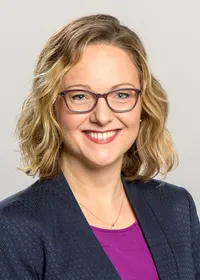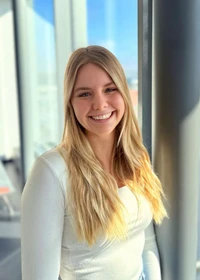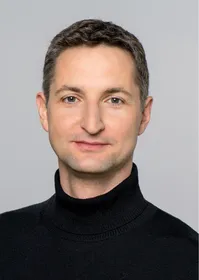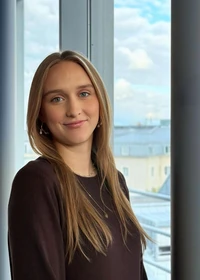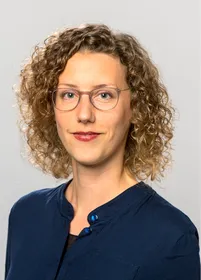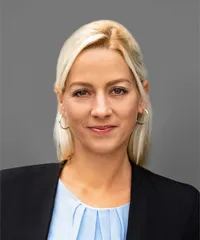Prof. Dr. Tina Seidel
+49 (89) 289 25114
Room 424
tina.seidel(at)tum.de
Further information on ORCID and FIS TUM
Prof. Dr. Tina Seidel has held the Friedl Schöller Endowed Chair of Educational Psychology at the Technical University of Munich since 2010. Important research contributions include research on digital educational technologies such as simulations for university teaching, the development of professional vision among teachers at schools and universities, video analyses of teaching-learning interactions, as well as meta-analyses and evidence-based teaching. She is currently Director of the TUM Center for Educational Technologies, where she heads the Evidence in Practice unit and the Clearing House Unterricht. She has also been deputy spokesperson for the DFG research group Cosima from 2017-2024. She is a member of the Aktionsrat Bildung since 2015.
Gabriele Melion
+49 (89) 289 25118
Room 423
sek.paedpsych(at)sot.tum.de
Gabriele Melion is secretary/office manager at the Friedl Schöller Endowed Chair of Educational Psychology at the TUM School of Social Sciences and Technology. Since April 2023, she has been the point of contact for general questions about the professorship and is responsible for secretarial services. She is in charge of managing and controlling the financial resources, plans and books business trips for the professorship holder and the corresponding travel expense claims, and handles preparatory personnel matters for the professorship.
Begüm Arvaneh
+49 (89) 289 28287
Room 427
beguem.arvaneh(at)tum.de
Further information on ORCID
Begüm Arvaneh is a research assistant at the Friedl Schöller-Endowed Chair for Teaching and Learning Research at the TUM School of Education. Since April 2024 she has been working as a project coordinator for Clearing House Unterricht.
As part of her dissertation project, Begüm Arvaneh is focusing on the use of digital media in the classroom and the reflective skills of trainee teachers.
Dr. Ricardo Böheim
+49 (89) 289 25151
Room 426
ricardo.boeheim(at)tum.de
Further information on ORCID
CV
Publications
Dr. Ricardo Böheim is a postdoctoral researcher at the Chair for Educational Psychology (Prof. Dr. Tina Seidel) at TUM. After majoring in Science Education for Secondary School Teaching he completed his doctoral studies at the Department Educational Sciences (2016-2020). He worked as a postdoctoral researcher at the Department of Psychology at the University of Augsburg and returned to TUM in November 2021 to conduct his habilitation qualification.
His current research centers around teacher-student interactions and students’ active engagement in classroom learning. Further, he is interested in teacher professional development with a distinct focus on video-based learning environments and their potential to foster (preservice) teacher learning and teacher professional vision.
Dr. Meg Farrell
+49 (89) 289 25119
Room 427
meg.farrell@tum.de
Further information on ORCID
Dr. Meg Farrell is a postdoctoral researcher at the Chair for Educational Psychology at the Technical University of Munich (TUM). Currently, she works for the research projects of the Kompetenzverbund lernen:digital [Digital learning competence network] and for the Clearing House Unterricht [Teaching]. Within the Clearing House Unterricht team, she serves as the Kurzreview [Short review] Coordinator, and contributes to the collaborative development of research-practice transfer products.
Dr. Farrell completed her PhD (magna cum laude) in 2024 at TUM within the Teacher Education Video Improvement (TEVI) research project. Her dissertation focused on video-based learning environments for preservice teachers’ development of professional vision, experimentally investigating instructional design techniques for multi-media learning. She has a Bachelor’s degree in Psychology from the University of Kentucky (USA) and a Master’s degree in Education from TUM focused on Research on Teaching and Learning. Her research interests include educational technology, instructional design, evidence-informed teaching practices and interventions, cognitive and motivational learning processes, research-practice transfer, and research syntheses.
Jasmin Heinrichs
+49 (89) 289 24631
Room 426
jasmin.heinrichs(at)tum.de
Further information on ORCID
Jasmin Heinrichs has been a research assistant at the Friedl Schöller Endowed Chair for Educational Psychology at the TUM School of Social Sciences and Technology since April 2025. She works on the PAVE project and studies the professional perception of (prospective) teachers using eye tracking.
Dr. Maximilian Knogler
+49 (89) 289 24396
Room 418
maximilian.knogler(at)tum.de
Further information at ORCID
Maximilian Knogler is a senior researcher and faculty member at the Friedl Schöller Endowed Chair for Educational Psychology since April 2021.
Dr. Christian Kosel
+49 (89) 289 25183
Room 421
christian.kosel(at)tum.de
Further information on ORCID
From March 2017 to May 2021, Christian Kosel worked as a research assistant and Ph.D. student with Prof. Dr. Tina Seidel at the Chair of Educational Psychology at the Technische Universität München. In May 2021, he received his Ph.D. from the TUM School of Education with a thesis on the visual expertise of teachers (grade: summa cum laude). Since May 2021, he has continued his research as a postdoctoral researcher and is working on his habilitation. Before coming to the Technische Universität München, he studied sociology and statistics at the Ludwig-Maximilians-Universität in Munich. His current research focuses on the analysis of complex eye movement patterns and other process-based data (e.g. emotions) collected under both laboratory and natural conditions. In addition, he is working on the methodological development of eye-tracking analysis procedures to increase their accuracy and potential applications in psychological research.
Alina Kreitmaier
Room 421
alina.kreitmaier(at)tum.de
Further information on ORCID
Alina Kreitmaier has been working as a research assistant at the Friedl Schöller Endowed Chair for Educational Psychology at the TUM School of Social Sciences and Technology since October 2025. Prior to this, she studied neuroscience at master's level and investigated the sleep behavior of mice before and after the administration of anesthetics. She is currently working on the LENS project, which combines eye-tracking research with simulation-based training with the aim of helping prospective teachers develop professional vision.
Fabian Reinwarth
Room 418
fabian.reinwarth(at)tum.de
Further information on ORCID
Fabian Reinwarth has been a research assistant at the Friedl Schöller Endowed Chair in Educational Psychology since 2024.
In his dissertation project, Fabian Reinwarth is investigating how scientific evidence needs to be processed efficiently in order to be effectively received by teachers, and how teachers cognitively process received evidence and transfer it into thinking and action in the classroom. At the same time, he works in the transfer centre and in the teaching clearinghouse of the competence network lernen:digital.
Sabrina Reith
+49 (89) 289 24245
Room 427
sabrina.reith(at)tum.de
Further information on ORCID
From October 2013 to February 2016, she completed a Bachelor's degree in Education with a minor in Sociology at the Ludwig-Maximilians-Universität in Munich. From October 2016 to February 2019 she also completed a Master's degree in Education with a focus on Educational Research and Educational Management at the LMU. From May 2019 to December 2019 project coordinator of the mentoring programme of the LMU Medical School at the Institute for Didactics and Educational Research in Medicine. Since January 2020 Research Assistant at the Chair of Teaching and Learning with Digital Media at the TUM School of Education. Since October 2024 Sabrina Reith works as a research assistant at the Friedl Schöller Endowed Chair of Educational Psychology and coordinates the Clearing House Academy.
As part of her dissertation project, she is working on the promotion of self-regulated learning with digital media.
Annika Schneeweiss
+49 (89) 289 25151
Room 426
annika.schneeweiss(at)tum.de
Annika Schneeweiss is a research assistant and coordinator of the TUM Center for Educational Technologies. Initially, she worked as a press officer for various publishers. From December 2016 to June 2022, she was Editorial Manager and Science Communicator in the BMBF-funded Clearing House Unterricht sub-project as part of the Quality Offensive Teacher Education. Additionally, from January 2020 to June 2022, Annika Schneeweiss coordinated the multimedia STEM learning platform Toolbox Lehrerbildung.
Kathleen Vogt
Room 421
kathleen.vogt(at)tum.de
Further information on ORCID
Kathleen Vogt has been a research assistant at the Friedl Schöller Endowed Chair for Educational Psychology at the TUM School of Social Sciences and Technology since October 2025. As part of her doctoral studies in the Collaborative Research Center SHARP (Project C03), she is investigating how personalized, simulation-based digital learning environments can promote the professional perception of medical students. Her focus is on the use of Eye Movement Modeling Examples (EMMEs) with AI-supported feedback to specifically develop communication skills in clinical visits.
Dr. Katharina Willis, MBA
katharina.willis(at)tum.de
Dr Katharina Willis has been a research associate at the Friedl Schöller Endowed Chair of Educational Psychology at the Technical University of Munich (TUM) since 2013 and is currently working at the TUM Center for Educational Technologies. She was previously involved in the BilWiss-Beruf project, which focuses on the development of professional teaching perception among teachers at the beginning of their careers.
Katharina Willis studied Sports, Media and Communication at TUM and at Hawaii Pacific University in the USA. As an external doctoral candidate at the Chair of Sports Psychology, she received the TUM Doctoral Scholarship for Women in Research and Teaching. At the same time, she completed an Executive MBA in Innovation & Business Creation at UnternehmerTUM and UC Berkeley (USA). Here she received the Degree² scholarship from the Graduate School. In her dissertation (2009–2013), she examined the effects of problem-based teaching and learning in a field experiment. In this experimental control group design with pre-/post-measurement, she analysed the movement quality and teamwork skills of girls aged 6 to 13 years using video data.




